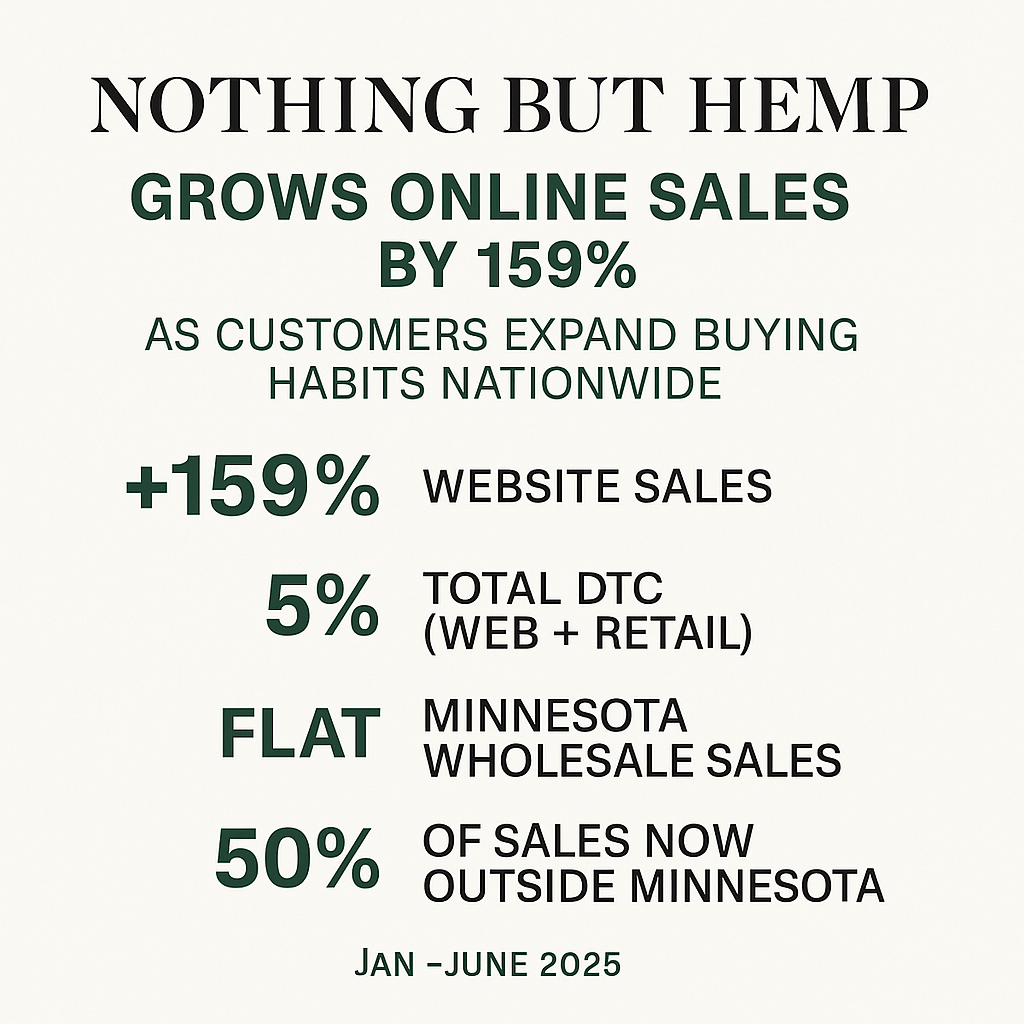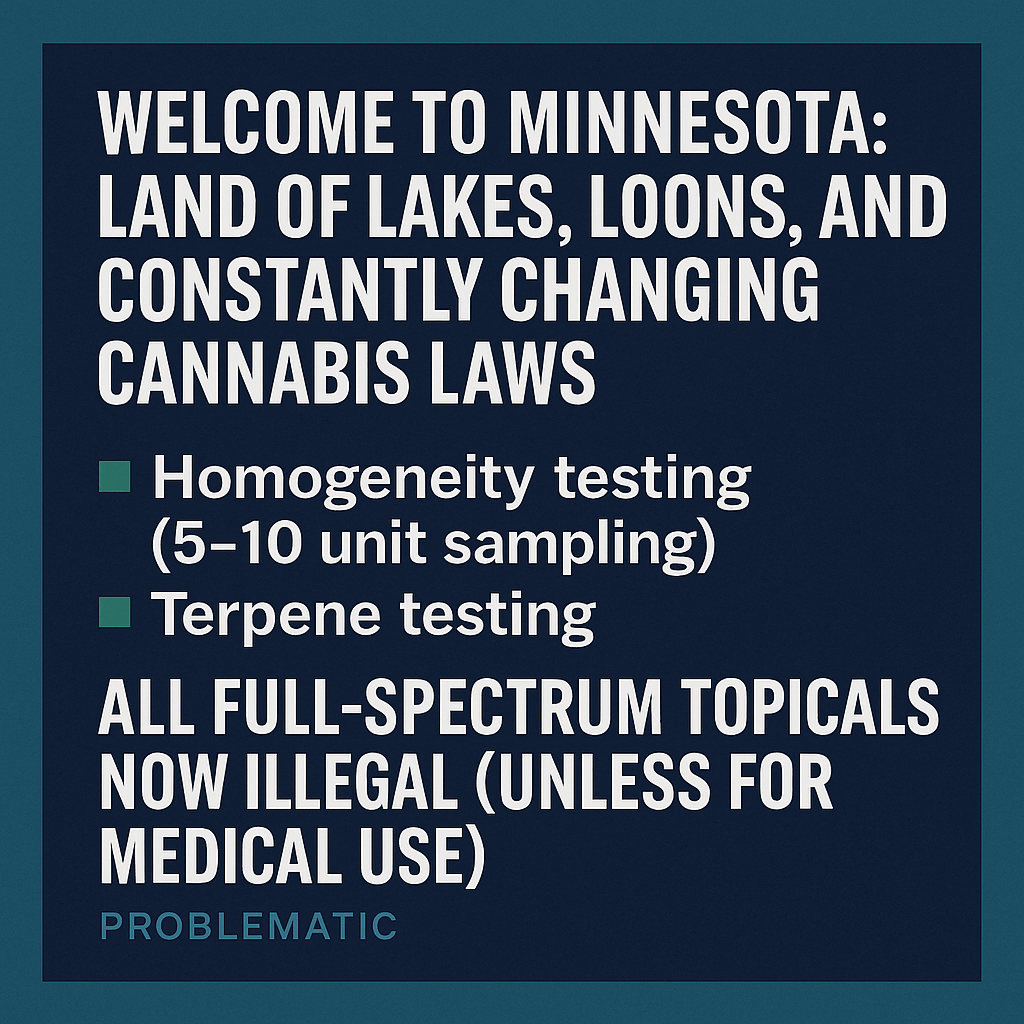Introduction
The U.S. hemp industry is once again under federal attack. Buried on page 113 of the FY2026 Agriculture, Rural Development, Food and Drug Administration, and Related Agencies Appropriations Bill, a provision championed by Rep. Andy Harris (R-MD) would redefine hemp in a way that outlaws nearly all hemp-derived cannabinoid products, including those compliant with the 2018 Farm Bill. This controversial move is being positioned as a “loophole closure,” but in reality, it represents one of the most significant assaults on the legal hemp sector since its federal legalization.
The proposed language would classify any hemp product with a “quantifiable” amount of THC (tetrahydrocannabinol)—even trace amounts—as illegal. This subtle but dangerous change would have a catastrophic ripple effect across farming, retail, manufacturing, and consumer access. It's a backdoor ban that mimics the failed “Mary Miller Amendment” from 2023, which was rejected thanks to industry and public backlash.
Although this appropriations bill has historically struggled to pass through both chambers of Congress in its full form, the hemp industry cannot afford complacency. Appropriations bills can carry significant policy riders, and as the chair (or “Cardinal”) of this powerful subcommittee, Rep. Harris has considerable sway in shaping the language and direction of U.S. agriculture policy.
What’s Actually in the Bill?
The FY2026 appropriations bill contains multiple controversial provisions. Chief among them is the hemp redefinition clause, but there are broader funding and regulatory issues impacting agriculture, food security, and rural development.
Here’s a breakdown of the most critical issues:
1. Redefinition of Hemp – A Federal Ban in Disguise
The bill redefines hemp by stating that any product with “quantifiable amounts of THC” would no longer meet the definition of legal hemp. This vague term isn’t based on a scientific threshold or any toxicological risk—it essentially means if it can be measured, it’s banned.
Key implications:
-
Outlaws most hemp products: Many full-spectrum CBD products, minor cannabinoids (like CBG, CBC, CBN), and even hemp foods could become illegal overnight due to natural trace levels of THC.
-
Contradicts the 2018 Farm Bill: The Farm Bill legalized hemp as cannabis with ≤0.3% Delta-9 THC by dry weight. This new proposal moves the goalposts entirely, undermining a legal framework that has supported thousands of businesses and farmers.
-
THCA confusion: The inclusion of THCA (a non-intoxicating precursor) as part of the THC calculation is scientifically and legally contentious. THCA does not produce a high and is found in raw hemp plants. If passed, this could ban even raw hemp flower.
2. Attack on Hemp-Derived Intoxicants and Non-Intoxicating Cannabinoids Alike
Although Rep. Harris and his allies claim the intent is to curb intoxicating hemp products like Delta-8 and Delta-10 THC, the bill’s language is so broad that even non-intoxicating CBD and CBG products would be swept up in the ban.
This bill lacks nuance. Instead of targeting specific compounds or establishing a regulatory framework for potency, labeling, or age gating, it carpet bombs the entire hemp cannabinoid category, including:
-
Full-spectrum CBD oils
-
Minor cannabinoid blends
-
Topicals with trace cannabinoids
-
Hemp-derived functional beverages
-
Edibles compliant with both state and federal law
In effect, this provision equates trace THC with high-THC cannabis, despite vast differences in safety, effect, and usage.
3. Precedent for Future Overreach
If this language makes it into law, it could embolden federal overreach into other agricultural or natural product sectors. By casually overturning previously accepted science-based thresholds, Congress would signal that no definition is safe and industry compliance means little if political tides shift.
This precedent:
-
Destroys regulatory stability
-
Undermines state programs that regulate hemp-derived products responsibly
-
Opens the door to bans based on arbitrary trace compound detection
4. Cuts to Agricultural Research and Development
Beyond hemp, the FY2026 bill slashes funding to critical USDA and NIFA (National Institute of Food and Agriculture) programs, undermining research, education, and innovation in agriculture.
Impacts include:
-
Reduced support for land-grant universities and agricultural colleges
-
Fewer grants for sustainable farming research
-
Setbacks in climate-resilient crop development
-
Loss of extension services that support rural farmers and ag innovation
For a nation grappling with climate volatility and global competition, defunding agricultural R&D is short-sighted and harmful to long-term food security.
5. Nutrition Assistance Cuts
The bill proposes cuts to food security programs, including:
-
SNAP (Supplemental Nutrition Assistance Program)
-
WIC (Women, Infants, and Children Program)
-
School nutrition support
These programs keep millions of Americans fed, particularly in underserved rural communities. Pulling funding from these essential safety nets during a time of economic uncertainty and inflation would lead to:
-
Increased child hunger
-
Poorer public health outcomes
-
Greater strain on emergency food providers
6. Hindering Rural Development and Infrastructure
The proposed appropriations also scale back investments in rural infrastructure, such as:
-
Broadband expansion
-
Rural water and sanitation systems
-
Transportation upgrades
Without these basic services, rural communities struggle to attract businesses, maintain schools, or provide adequate healthcare. This bill sends the wrong message at a time when revitalizing rural America should be a bipartisan priority.
7. Political Motivation over Public Health
Rep. Harris’s repeated efforts to ban hemp products suggest this is less about public safety and more about ideology or protecting entrenched cannabis or pharmaceutical interests. If there are genuine public health concerns, why not:
-
Establish product safety standards?
-
Implement age restrictions and labeling guidelines?
-
Invest in FDA rulemaking to ensure transparency and consumer protection?
Instead, this bill opts for prohibition over regulation, with the consequences falling on small businesses, farmers, and consumers.
8. Economic Devastation
The hemp industry is a multi-billion dollar engine for rural and agricultural economies. According to recent reports:
-
Over 50,000 U.S. jobs are tied to hemp cultivation and manufacturing
-
Thousands of small businesses depend on cannabinoid product sales
-
State governments have invested heavily in licensing, inspection, and testing systems
A federal ban on trace-THC hemp products would result in:
-
Mass layoffs
-
Product recalls and inventory destruction
-
Legal uncertainty for retailers and farmers
-
Loss of tax revenue for local governments
This proposal would bankrupt an entire industry segment with the stroke of a pen.
What Can Be Done?
Despite the threats, this bill has not passed yet, and it still faces numerous hurdles in both chambers of Congress. Historically, agriculture appropriations bills have failed to clear the Senate or have been reworked through continuing resolutions. However, industry complacency would be a fatal mistake.
Action steps:
-
Contact your members of Congress: Urge them to oppose any hemp redefinition in the FY2026 bill.
-
Join national and state hemp coalitions: Support groups like the U.S. Hemp Roundtable, HIA, and state-level organizations.
-
Submit comments and testify: If you’re a stakeholder, request to speak or submit statements during committee hearings.
-
Educate your community: Use social media, newsletters, and public forums to highlight what’s at stake.
Conclusion
The FY2026 federal appropriations bill, as currently written, is an unprecedented assault on the legal hemp industry. It masks prohibitionist intent with regulatory rhetoric, undermines the 2018 Farm Bill, and threatens farmers, small businesses, and consumers alike.
While it’s not yet law, it represents the most serious federal threat to hemp in years—and one that requires immediate, coordinated, and sustained resistance.
Now is the time to act—not just to protect hemp, but to stand against government overreach and protect the rights of agricultural innovators and natural product producers across the country.








































